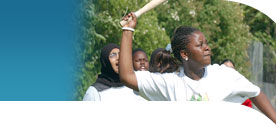



To make good progress pupils need continuity and opportunities for development across the key stages. To achieve this, curriculum planning at key stage 3 needs to:
The curriculum at key stage 2 provides pupils with opportunities to be physically active in a range of competitive, creative and challenge-type contexts. They learn new skills, using them in different ways and linking them to make phrases and sequences of movements. They communicate, collaborate and compete with each other. They develop an understanding of how to succeed in different activities and learn how to evaluate and recognise their own success.
By the end of key stage 2, most pupils are able to link skills, techniques and ideas and apply them accurately and appropriately in different contexts. When playing and performing they do so with precision, control and fluency. They understand how to use tactics and compositional ideas to produce successful outcomes. They are able to compare and comment on what they and others do and can use this understanding to improve their own performance. They can explain the importance of warming up before an activity and know why physical activity is good for their health.
The PE programme of study for key stage 3 builds on the knowledge, skills and understanding pupils acquire at key stage 2. During the key stage pupils become increasingly physically competent by:
Through the range of activities and variety of roles that pupils experience, they begin to make informed decisions about their own commitment to leading a healthy, active life. They begin to identify the types of activities and roles they prefer and are best suited to.
By the end of the key stage, most pupils are able to select and combine their skills, techniques and ideas, applying them to different activities with consistent precision, control and fluency. When planning and performing most draw on their knowledge of strategy, tactics and composition in order to help them work independently, in groups and in teams to achieve success. Most pupils are able to analyse and comment on their own and others' work, modifying and refining their skills and techniques to improve their own performance. Most know the types of roles they want to take on and are beginning to express preferences about the types of activities they might pursue both in and out of school.
Key stage 4 students use their skills, techniques and knowledge of strategies, tactics and compositional ideas in larger and more challenging contexts that involve more participants and require increasingly complex tactics, strategies and compositional ideas. Their physical competence is such that they are able to use skills and techniques within these demanding and dynamically changing situations that consistently show accuracy, precision, control and originality. They are able to critically analyse performance and demonstrate that they understand how skills, tactics, compositional ideas and levels of fitness relate to the quality and effectiveness of a performance.
Pupils begin to use their understanding of what physical competence, high-quality performance and a balanced, healthy lifestyle entails to select the roles and activities they wish to get involved in. They pursue these regularly both in and out of school and become involved in local and national sport, dance and healthy physical activity programmes.